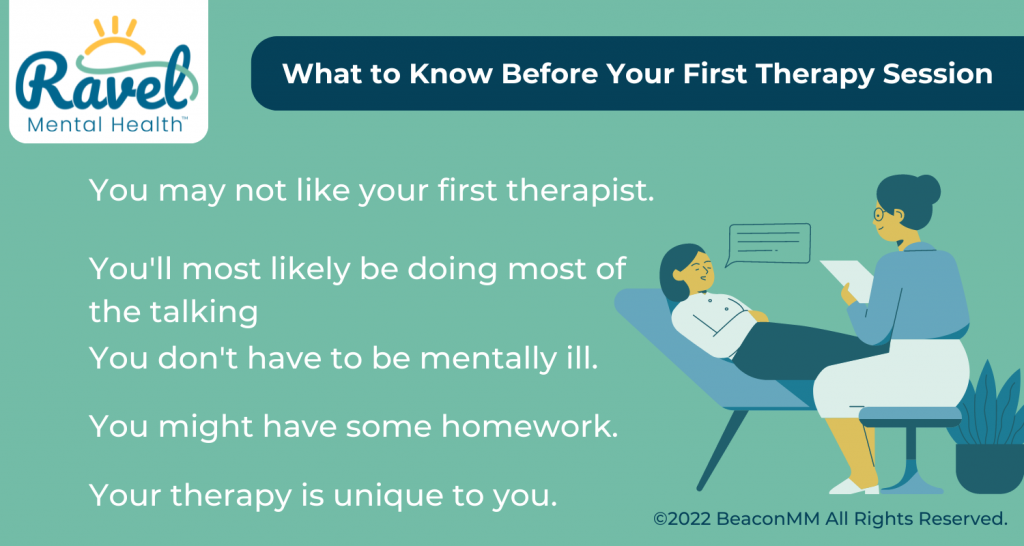Going to therapy for the first time can be intimidating and daunting. The idea of opening up to a stranger can be a difficult obstacle to overcome. However, getting professional guidance can be beneficial.
If you’ve never had therapy or done something similar, you may be unsure what to expect. You may be thinking about what you’ve seen in movies or television shows to guide your expectations. However, therapy has drastically changed over the last few years and may be different than expected.
So, what is going to a therapist like? Although everyone has their own therapy experiences, you can expect a few things. Here’s a guide on what to know before your first session.
Are you interested in the different therapy types you can receive? Sign up for Ravel Mental Health to learn about therapy types that could help you!
1. You May Not Like Your First Therapist

You have to prepare yourself for the possibility that you might not like your first therapist– and that’s okay. Finding a therapist you like and feel comfortable with might take trial and error. You may not know what qualities you like in a therapist on your first go.
However, as you continue your mental health journey, you will find qualities you enjoy and ones you’d like to stay away from. You may also realize which therapy types work better for you, such as holistic therapy. Knowing the modality of your mental health treatments can often help you have a better experience that is more beneficial.
As you move along your journey, you can pick up on exercises that help you get through stressful situations or ways to mitigate the symptoms of a mental health condition.
To help mitigate the chances of not liking your first experience, you can use Ravel Mental Health to help make the process go more smoothly. It lists therapists by their specialties, availability, modalities, and more. This helps you better understand what the therapist does and their treatment methods before you book an appointment with them.
2. You’ll Most Likely Be Doing Most of the Talking
One thing you may know about therapy is that it requires you to talk. And sometimes that means that you have to talk a lot. For your first session, your therapist needs to get a good understanding of who you are.
That will include getting to know what’s going on in your life, your lifestyle, your hobbies, what you do for work, who your family is, and more. You’ll be providing your therapist with a clear picture of your life so they can understand how your environment has shaped you and how it may be affecting you now.
Going to a therapist isn’t like listening to a lecture or getting advice. While the therapist will help guide the session with questions and provide feedback, therapy is a safe place to talk through your emotions and difficulties. Therapy is a method of processing what is going on in your head while someone helps guide your train of thoughts.
Many people will talk to their friends or family when they’re going through a difficult situation. When going to a therapist, you can get professional guidance on healthy methods of dealing with your emotions. But that will require you to open up about your feelings so your therapist can guide you in the right direction.
3. You Don’t Have to Be Mentally Ill
Some people think you have to have some kind of mental condition if you want to go to therapy. However, you don’t need to be mentally ill to seek therapy. Anyone can benefit from seeing a therapist.
Everyone will go through something difficult in their lifetime and may need help getting through it. They may not know how to get through a situation healthily and may turn to bad coping methods.
People can go to therapy for situations they might be living through, such as grieving for a loved one, feeling lost in the direction of their life, or needing help on how to set healthy boundaries with their family. Even those who aren’t living through a difficult situation can benefit from going to therapy as it allows a healthy outlet for your feelings.
It can also benefit people who think they may have some mental condition but are unsure what it is. People may not be able to recognize signs of depression, PTSD, or bipolar disorder if they’ve never learned about them. Going to therapy can help someone struggling with these conditions who have not been treated for them yet.
Are you interested in finding a therapist that matches your needs? Sign up for Ravel Mental Health today!
4. You Might Have Some Homework
One thing that you have to expect is the possibility of having homework. The goal of therapy is often to problem-solve issues. Your therapist may give you “homework” like tracking your mood or doing something that challenges you to stimulate growth.
The exercises you’ll do will help keep track of instances where you may have felt certain emotions arise or notice a reoccurring problem. When you track these behaviors, it can help you and your therapist identify patterns and their sources. This can sometimes lead to discovering why you feel a particular way and what you might want to avoid or overcome.
Your therapist may also assign exercises that are supplementary to your treatments during therapy sessions. This can include meditating, journaling, or making a lifestyle change. Sometimes these changes in behavior can be difficult as building new habits is challenging.
The homework you do will help direct your life in the direction you’d like it to go. Seeing a therapist can help you find the tools to get your life on the track you want. It’ll also keep you accountable as you may not want to not follow through on a commitment.
5. Your Therapy is Unique to You
Many people think that all therapy involves only talking to someone about your feelings. And while that may be true, therapy comes in many different shapes and sizes. Therapy can be through different modalities such as online, art, music, holistic, and more. There are many options for you to choose from.
You know yourself better than anyone and may realize that one form of therapy would be better for you than the other. Some people choose group therapy over individual sessions as they enjoy the sense of community that supports them. Others may want therapists that understand their BIPOC background.
Everyone’s mental health journey and therapy journey are unique to themselves. You can have therapists who work well for you and may not mesh with others. And your needs are different from those of your friends and family.
What kind of support you’d like to receive is up to you. Even if you choose conventional forms of therapy, your experience is your own.
This can also speak towards your experience of your journey. However you accomplish your goals, or even if you take a few steps back, it’s all okay because it’s your experience. Therapy is for you and helps improve your life.
How Can Ravel Mental Health Help You?
Ravel Mental Health is an online platform that connects you with a therapist that matches your needs. With advanced filters, you can search for exactly what you want.
It will help you find therapists in your area that are treating people like you. You can access their available calendar and book your appointment with just a few easy clicks. This avoids wasting time playing phone tag and accommodates your schedule and needs.
Ravel Mental Health is here to mitigate bad client-therapist matches. If you’re ready to start your mental health journey, we’ll help you find the experience you’re looking for.
Are you ready to invest in yourself? Sign up for Ravel Mental Health to get connected with a therapist!
